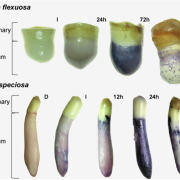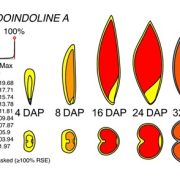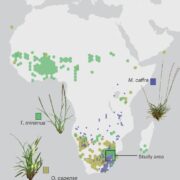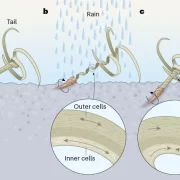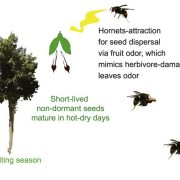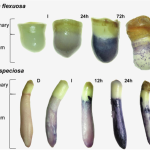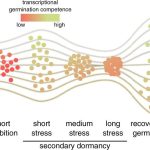PIMT and ABI-TFs cascade mediates desiccation tolerance and longevity in rice seeds (Development)
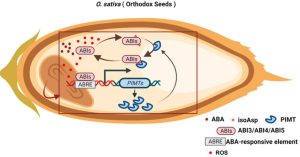 The ABA INSENSITIVE (ABI) transcription factors (TFs) (ABI3, ABI4, ABI5) regulate DT and play essential roles during seed germination. Therefore, these TFs must be functionally protected during seed desiccation. Recalcitrant seeds are sensitive to desiccation, while orthodox seeds possess a remarkable ability to tolerate desiccation. However, the mechanism that makes orthodox seeds desiccation-tolerant is not clear. By comparing two rice varieties contrasting for seed desiccation tolerance (Oryza sativa and O. coarctata), Kamble and Majee revealed that PROTEIN L-ISOASARTYL METHYLTRANSFERASE (PIMT) an enzyme that repairs abnormal isoaspartyl (isoAsp) residues in proteins, plays an essential role during DT acquisition. Reduced PIMT activity correlates with a reduced DT in recalcitrant seeds. The authors identified that PIMT expression is regulated by the coordinated action of ABA and ABI TFs. While ABA levels are stable in the two species, ABI-TF-dependent ABA signalling was found severely affected in recalcitrant seeds during maturation. Furthermore, PIMT maintains and positively regulates the activity of ABI TFs by repairing abnormal isoAsp residues during seed desiccation. In conclusion, unlike recalcitrant seeds, orthodox seeds have high PIMT activity due to well-expressed ABI TFs. This PIMT activity protects and facilitates the activity of ABI TFs by controlling the accumulation of detrimental isoAsp residues and eventually governs orthodox seeds to be desiccation-tolerant. (Summary by Subodh Verma @subodhshanky) Development 10.1242/dev.200600
The ABA INSENSITIVE (ABI) transcription factors (TFs) (ABI3, ABI4, ABI5) regulate DT and play essential roles during seed germination. Therefore, these TFs must be functionally protected during seed desiccation. Recalcitrant seeds are sensitive to desiccation, while orthodox seeds possess a remarkable ability to tolerate desiccation. However, the mechanism that makes orthodox seeds desiccation-tolerant is not clear. By comparing two rice varieties contrasting for seed desiccation tolerance (Oryza sativa and O. coarctata), Kamble and Majee revealed that PROTEIN L-ISOASARTYL METHYLTRANSFERASE (PIMT) an enzyme that repairs abnormal isoaspartyl (isoAsp) residues in proteins, plays an essential role during DT acquisition. Reduced PIMT activity correlates with a reduced DT in recalcitrant seeds. The authors identified that PIMT expression is regulated by the coordinated action of ABA and ABI TFs. While ABA levels are stable in the two species, ABI-TF-dependent ABA signalling was found severely affected in recalcitrant seeds during maturation. Furthermore, PIMT maintains and positively regulates the activity of ABI TFs by repairing abnormal isoAsp residues during seed desiccation. In conclusion, unlike recalcitrant seeds, orthodox seeds have high PIMT activity due to well-expressed ABI TFs. This PIMT activity protects and facilitates the activity of ABI TFs by controlling the accumulation of detrimental isoAsp residues and eventually governs orthodox seeds to be desiccation-tolerant. (Summary by Subodh Verma @subodhshanky) Development 10.1242/dev.200600


